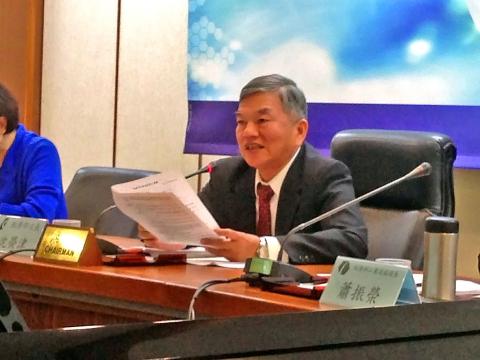Taiwan’s industrial sector could lose US$6 billion at most and at least US$2.341 billion annually in the years after the China-South Korea free-trade agreement (FTA) goes into effect, the Ministry of Economic Affairs said yesterday.
The latest impact evaluation is far less than the ministry’s previous assessment of a potential loss of between NT$260 billion and NT$650 billion (US$8.32 billion to US$20.8 billion) per year, though the ministry denied it had provided the earlier report.
The ministry attributed the lower assessment to tariff reductions by China on goods imported from South Korea being less than the ministry had expected.

Photo: CNA
“The potential impact [on Taiwan] from the FTA is limited for now, but it will still affect industries in the long term,” Vice Minister of Economic Affairs Shen Jong-chin (沈榮津) told a news conference.
The ministry’s evaluation was conducted by the Chung-Hua Institution for Economic Research (CIER, 中華經濟研究院) on the premise that the Beijing-Seoul deal is to take effect at the beginning of next year.
According to CIER’s evaluation, Taiwan’s GDP would decline by 0.04 percent after the agreement has been in effect for one year and would decline by 0.15 percent after it has been in place for 20 years, Shen said.
When asked about the huge difference between the previous evaluation and this one, Industrial Development Bureau Deputy Director-General Hsiao Chen-jong (蕭振榮) said “the ministry never provided the [previous] number.”
Hsiao said that the NT$650 billion figure was shown in previous research conducted by the Industrial Economics and Knowledge Center (IEK, 產業經濟與趨勢研究中心) of the government-funded Industrial Technology Research Institute (工業技術研究院).
“The previous evaluation was not run by the ministry,” Hsiao said.
Shen said the IEK’s research model was run under the hypothesis of a worst-case scenario, but further details of the trade agreement led the ministry to reach a different assessment.
However, both former minister of economic affairs Woody Duh (杜紫軍) and Deputy Minister of Economic Affairs Bill Cho (卓士昭) have on various occasions quoted the IEK’s study after Beijing and Seoul completed their trade talks in November last year.
Citing the latest research by CIER, Shen said that after the trade agreement takes effect, Taiwan’s petrochemical, textile and glass companies could lose US$170 million at most per year to trade that goes to South Korean firms.
Taiwan’s steel, automotive, polarizer, display and machine tool products would remain unaffected by the trade agreement in the first 10 years after the pact goes into effect, though they could lose up to US$6 billion and at least US$2.341 billion when — as the deal outlines — tariffs on South Korean goods are removed in 20 years, the CIER report said.
Shen said the research on the trade pact could help the ministry adjust its negotiation tactics for a trade in goods agreement with China.

In Italy’s storied gold-making hubs, jewelers are reworking their designs to trim gold content as they race to blunt the effect of record prices and appeal to shoppers watching their budgets. Gold prices hit a record high on Thursday, surging near US$5,600 an ounce, more than double a year ago as geopolitical concerns and jitters over trade pushed investors toward the safe-haven asset. The rally is putting undue pressure on small artisans as they face mounting demands from customers, including international brands, to produce cheaper items, from signature pieces to wedding rings, according to interviews with four independent jewelers in Italy’s main

Japanese Prime Minister Sanae Takaichi has talked up the benefits of a weaker yen in a campaign speech, adopting a tone at odds with her finance ministry, which has refused to rule out any options to counter excessive foreign exchange volatility. Takaichi later softened her stance, saying she did not have a preference for the yen’s direction. “People say the weak yen is bad right now, but for export industries, it’s a major opportunity,” Takaichi said on Saturday at a rally for Liberal Democratic Party candidate Daishiro Yamagiwa in Kanagawa Prefecture ahead of a snap election on Sunday. “Whether it’s selling food or

CONCERNS: Tech companies investing in AI businesses that purchase their products have raised questions among investors that they are artificially propping up demand Nvidia Corp chief executive officer Jensen Huang (黃仁勳) on Saturday said that the company would be participating in OpenAI’s latest funding round, describing it as potentially “the largest investment we’ve ever made.” “We will invest a great deal of money,” Huang told reporters while visiting Taipei. “I believe in OpenAI. The work that they do is incredible. They’re one of the most consequential companies of our time.” Huang did not say exactly how much Nvidia might contribute, but described the investment as “huge.” “Let Sam announce how much he’s going to raise — it’s for him to decide,” Huang said, referring to OpenAI

The global server market is expected to grow 12.8 percent annually this year, with artificial intelligence (AI) servers projected to account for 16.5 percent, driven by continued investment in AI infrastructure by major cloud service providers (CSPs), market researcher TrendForce Corp (集邦科技) said yesterday. Global AI server shipments this year are expected to increase 28 percent year-on-year to more than 2.7 million units, driven by sustained demand from CSPs and government sovereign cloud projects, TrendForce analyst Frank Kung (龔明德) told the Taipei Times. Demand for GPU-based AI servers, including Nvidia Corp’s GB and Vera Rubin rack systems, is expected to remain high,